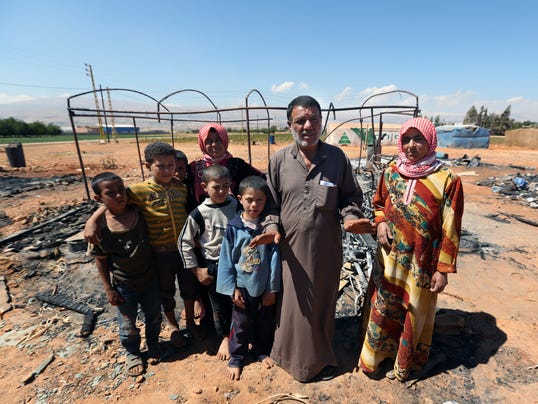By Kathryn Maureen Ryan
Managing Editor Impunity Watch
BEIRUT, Lebanon – Ibrahim Abbas Ali and his family, who fled the deadly civil war in Syria in the hopes of finding safety in neighboring Lebanon, awoke in the middle of the night to the sound of gunfire outside their tent in a makeshift refugee camp housing around 200 people. The family fled to the nearby fields. The Gunmen set fire to several tempts, including the one used by Mr. Ali and his family, destroying the few belongs the family of 18 managed to bring across the border. The family also lost their officials documents, including their U.N. refugee cards. “We lost all the aid we received from the U.N. and all we were left with are the clothes we are wearing,” Mr. Ali said.

The camp appears to have been the target of a wave of so called revenge attacks that were carried out after one of several Lebanese soldiers who was captured by militants in Syria in a cross-border wave was beheaded by jihadists earlier this months. The killing of the Shiite soldier by Sunni extremists has aggravated sectarian tensions in Lebanon, a country whose population is now about 50% refugees, which has become bitterly divided over the ongoing war in Syria.
Violence targeting the refugee population has spread to the capital where a mob of young men attacked Syrian refugees sheltering under a bridge over the weekend. In other parts of Beirut, leaflets have been dispersed calling on Syrians to leave or “be slaughtered or tortured to death.”
Gunmen attacked refugees living in a camp near the town of Brital. The residents described a night of terror that was reminiscent of the horrors they fled in Syria. Mohammed Darwish, 45, said most of the camp’s residents were sleeping on the night of Sept. 6 when gunmen, many of them wearing masks, arrived in several SUVs. “Oh you dogs. We are coming to slaughter you,” he heard the gunmen yell as they fired their weapons into the air, driving out the camp the terrified residents. Mr. Darwish said he too fled into the nearby fields with his six children. A Lebanese resident of the town of Brital said the attack was carried out by local “thugs and troublemakers” who do not represent the feelings of the Brital community.
“We live in the fear of being subjected to an attack, although we have not been threatened,” said Fatoum Allawi, 65, who fled from the northern Syrian town of Saraqib and is now sheltering near Riyak. “We are mostly women and children here with a few men who work nearby,” she said as she sat on a plastic chair holding her granddaughter.
Syrian refugees living in Lebanon have faced discrimination both from violent thugs and members of the community who resent their entering the country and members of the government who have refused to recognize their status as refugees and have refused to provide government assistance to Syrians fleeing atrocity at home. Earlier this month the Lebanese Labor Minister Sejaan Azzi proposed that all Syrian refugees should go home suggesting that they should return to rebel held or regime held areas based on their loyalties. He said, “What is at stake now is the proposal that refugees who trust the regime return to the areas under regime control, and those who have faith in Nusra Front and ISIS go to the regions under their control.”
Shortly after the Labour ministers statements the Lebanese government announced its intention to set up two camps for Syrian refugees along the border, marking the first time the government established such camps in the three year history of the deadly conflict in Syria. Social Affairs Minister Rashid Derbas announced the plan last Thursday. “The Council of the Ministers has taken a decision to set up camps for Syrian refugees, one in the Bekaa valley in the Masnaa area and one in the Abda area in northern Lebanon,” Derbas said. “Estimates are that each camp could accommodate 10,000 people,” he added.
The sudden influx of refugees into the ebonies population has placed great strains on the country’s limited resources. The government has so far failed to adequately address the issue, inflaming tensions between Lebanese citizens and refugees fleeing violence in Syria, who now fear that the war has followed them across the border. Aisha Mohammed, a 26-year old Syrian refugee said she came from Syria’s northern province of Raqqa, which is now held by the Islamic State of Iraq and the Levant group and has come under increasing attack by Syrian regime warplanes. “I wish I could return to Raqqa but the bombings have intensified,” she said. “We have fled from fear in Syria and here we are living in fear in Lebanon.”
For more information Please see:
USA Today – Syria refugees attacked in Lebanon – 13 September 2014
The Daily Star: Lebanon – Lebanon minister: All Syrian refugees must return home – 5 September 2014
The Daily Star: Lebanon – Lebanon to open first Syria refugee camps: minister – 11 September 2014
The New York Times – Syrian Refugees Surpass 3 Million, U.N. Says – 29 August 2014

